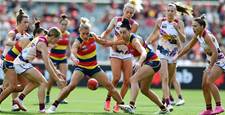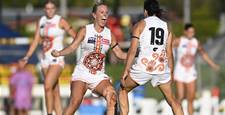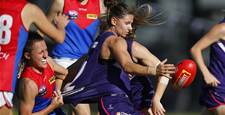Australian players have joined the growing multi-national player protests against the use of turf as the main playing surface for the 2015 FIFA Women’s World Cup.
Australian players have joined the growing multi-national player protests against the use of turf as the main playing surface for the 2015 FIFA Women’s World Cup.
In a media statement, Professional Footballers Australia, the players' representative body stated the position of the its members, which includes the majority of the Matildas as:
"Professional Footballers Australia (PFA) has today confirmed the opposition of Matildas players’ to the use of artificial turf for the 2015 Women’s World Cup and called on football’s universal rights to extend to women."This statement is in stark contrast to the recent comments articulated by Emma Highwood, the FFA's Head of Women's Football, in a recent interview on ABC TV.“We are supportive of Canada and we are looking forward to the World Cup” said Highwood.
“Certainly we don’t have an issue with it being played on artificial turf.”
[More: FFA: ‘We don’t have an issue with the Women’s World Cup being played on artificial turf.’]
Highwood went on to clarify that no complaints had been raised by the players with the FFA.
While the players had not made a complaint with the FFA, the playing group had expressed their concerns with the PFA.
The result was a letter, obtained by The Equalizer, submitted on 10 July 2014 to FIFPro (the World Players’ Union), addressed to general secretary Theo van Seggelen, putting forward a case based on the physical impact of turf, as well gender equity.
[Full PFA Letter | The Equalizer Turf Protest Coverage]
Matildas co-captain Kate Gill, a signatory on the letter to FIFPro believes strongly in the issue.
“The World Cup is the highest level of women’s football and the pitch should reflect this and also be of the highest possible standard, as they would be for the men’s tournament,” said Gill.
“Having had to play on artificial turf on numerous occasions I can say it should only be utilised when it is absolutely necessary due to the environment. With this tournament being held in summer in Canada this is certainly not the case.”
Matildas and Western New York Flash striker Sam Kerr, who was one of the first to make comments, and Matildas and Chicago Red Stars midfielder Emily van Egmond consider, that as well as a equity issue, it also one of health.
Both players have spent the majority of the year playing on turf in the NWSL and while they understand playing on turf is a necessity in running a viable league, it should not be the case for biggest tournament in women's football.
“The surface totally changes the game and things as common place as slide tackling become much more dangerous on artificial turf,” Kerr said.
“Because of this neither women nor men enjoy playing on it, especially when the climate allows for natural grass. We should be treated as equals to our male counterparts and artificial turf would never be used for the Men’s World Cup.”
While Van Egmond echoed her thoughts.
“Every player that makes it to the World Cup has worked tirelessly in the pursuit of their goal of making it to the top of the sport,” Van Egmond said.
“Their efforts should be rewarded with the best possible facilities so they are able to showcase themselves to their best of their abilities. The use of artificial turf casts doubts over the players ability to perform at their best.”
FIFPro's potential involvement
With the PFA escalating the Australian protest to FIFPro, the next question is whether the organisation whose mission it is to 'support players' will be a proponent of the female footballers on this brewing issue.
While organisation does have a women's football committee, a significant majority of its advocacy has been in the realm of men's football.
Australian FIFPro Board Member Brendan Schwab has indicated that the world player's union will take up the cause.
“At the highest levels of the game the best male and female footballers should clearly be entitled to the same working conditions and the same working environment,” said Schwab.
“Football prides itself on its universal values and we can not see any justification for the world’s best players not having access to the world’s best conditions at the highest levels of the game.
"Football should lead the world in the promotion of gender equity, however, this decision suggests this is not a priority and as a result football sadly lags behind sports such as tennis on this vital principle.”
PFA Chief Executive Adam Vivian mirrored Schwab’s calls for gender equality.
“The PFA has been in close discussions with the Matildas playing group regarding the use of artificial turf at next year’s World Cup,” Vivian said. “If the women’s game is to achieve parity with the men’s it is vital female players have access to the best possible working conditions, with pitch quality a key component of this.
“The PFA is eager to work with Football Federation Australia (FFA) to ensure the players’ voice is heard and will continue to collaborate with FIFPro on the matter.”
Related Articles
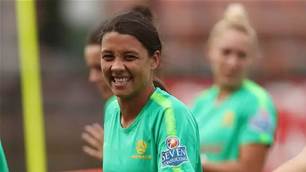
Kerr, fellow Matildas to be consulted in coach search
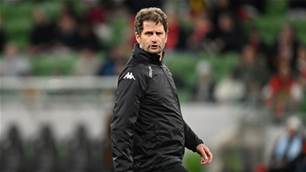
'Timing not right': Montemurro's verdict on Matildas vacancy
.jpg&h=172&w=306&c=1&s=1)





